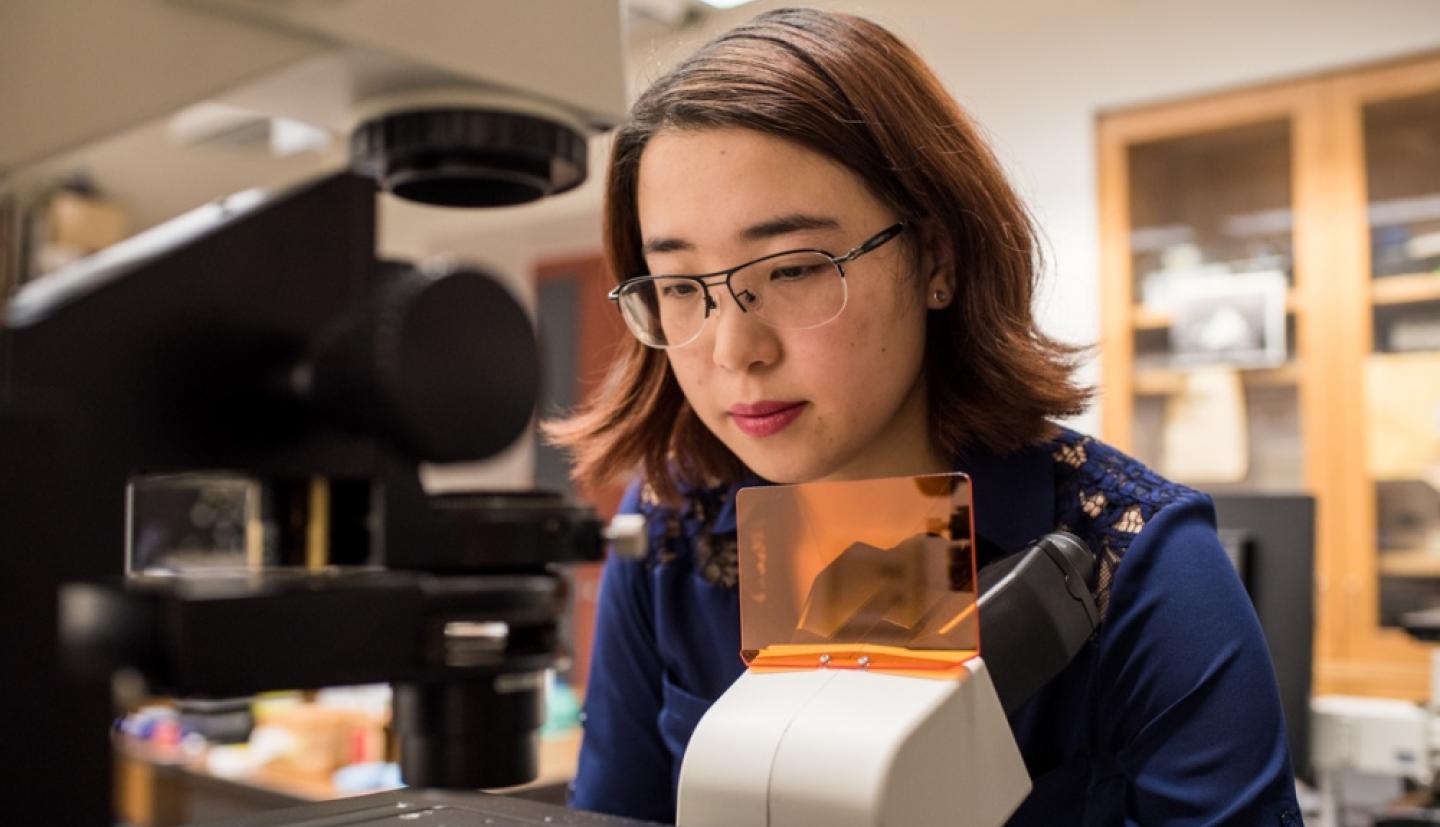Viruses are the most abundant biological entities on Earth, capable of infecting every type of life form: animals, plants and bacteria. The scientific struggle against viral scourges such as herpes, ebola and influenza includes training cells to recognize invaders before they strike, and preventing viruses from entering cells during the early stages of an infection.
But once a virus has conquered those defenses, sneaking into a cell and hijacking its machinery to mass-produce more of itself, what if the viruses couldn’t get back out? What if the cell membrane could be coaxed into becoming like a prison, preventing further infection to the host body?
Yi Wen, a fifth-year doctoral student in the field of biochemistry, molecular and cell biology, is exploring that radical concept. Her innovative approach earned her the 2018 Harry and Samuel Mann Outstanding Graduate Student Award.
An interdisciplinary scholar, Wen is co-advised and works in the labs of Gerald Feigenson and Volker Vogt, both professors in the Department of Molecular Biology and Genetics. In Vogt’s lab, she studies virology, and in Feigenson’s she is exploring membrane biophysics and lipid chemistry.
The “skin” of a cell is composed of a double layer of lipids (fatty acids). The heterogeneous membrane is dynamic, constantly transforming itself to perform specific functions or to react to its environment.
Wen’s research focuses on the lipid “PIP2.” It’s a relatively small component of cell membranes, only 1-2 percent of total lipids, “but it plays a major role in cell function and also in HIV infection,” Wen said.
One of Wen’s first breakthroughs was discovering how to work effectively with PIP2.
“The molecule PIP2 can be a nightmare of unexpected, unexplained and irreproducible results, as we were warned at the start by colleagues around the country,” Feigenson and Vogt explained in a letter recommending Wen for the award.
After struggling with such results, Wen experimented with PIP2 at tenfold lower concentrations than previous researchers. She discovered that PIP2 is highly sensitive to certain metal ions, such as calcium, magnesium and zinc. Minute amounts of such metals seem to be the “on-switch” that causes PIP2 molecules to begin clustering in membranes. In living cells, such clusters of the highly charged PIP2 molecules are likely to act as platforms where important cellular events take place.
From this discovery, Wen found another, which she is exploring further now: viruses such as HIV may require PIP2 clustering to exit from cells. If PIP2 could be prevented from clustering, the deadly virus could remain trapped in the cell.
“The metal ions shield PIP2, and only specific proteins are likely to be able to compete against those metal ions to have access to PIP2,” she said. “HIV appears to require those PIP2 clusters as assembly and release sites of new viruses. I think this could be HIV’s Achilles’ heel.”
The Harry and Samuel Mann Outstanding Graduate Student Award was established in 2012 by Thomas Mann ’64 and Diann Mann ’66, and Cornell parents Jeanne (Mann) Newman and Gary Newman. The annual $20,000 award honors Harry and Samuel Mann, the children of Russian immigrants and some of the earliest commercial suppliers of biochemicals for life science research, by recognizing the next generation of biochemical, molecular and cell biologists.
“We hope this award will continue to help enable stunning, elegant research such as that of Yi Wen that will allow all of our societies to benefit from the understanding of science,” said Thomas Mann, Samuel’s son.
Wen began to be passionate about HIV research in college, where she worked full time at the Comprehensive AIDS Research Center in Beijing during her senior year. Her career goals include helping to develop novel vaccines and treatments against emerging infectious diseases and continuing her work with HIV. Wen will use the Mann Award to fund a two-month exchange at Heidelberg University in Germany, learning advanced cellular techniques related to HIV viral assembly.
“I am deeply appreciative of receiving this award and the opportunities it will provide me,” she said.
Krisy Gashler is a freelance writer in the College of Agriculture and Life Sciences.







